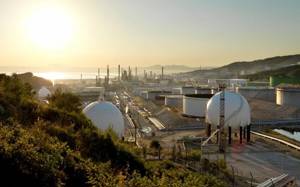Total, Ecoslops study viability of maritime oil residue processing plant
Ecoslops, a technology company that upgrades ship-generated hydrocarbon residues, or “slops”, into new fuels and light bitumen, has signed a memorandum of understanding with Total, to set up a maritime-transport-induced oil residue waste-processing unit in La Mède, near Marseille. Within this agreement, Ecoslops and Total will conduct a detailed study and reach a final investment decision in 2017.
Every year, the global fleet produces oil residues, also known as “slops”, containing maritime hydrocarbon residues, accumulated at the bottom of ship tanks. MARPOL international regulations stipulate that it is forbidden to discharge these slops into the sea, and that all slops must be discharged in ports. In most cases, these slops are incinerated when they could be upgraded into fuels and light bitumen. Ecoslops made this processing possible through its micro-refinery technology, suited to these types of residues.
As part of the La Mède transformation project, which aims to develop projects for the future, the construction of such a processing unit would cater to the growing maritime transport’s need to sustainably upgrade its waste.
Francois Bourrasse, director of Total’s La Mède site said, “In 2015, Total decided to invest in the La Mède site to transform it and create the first French bio-refinery. The construction of this oil residue regeneration unit strengthens the site’s industrial redeployment. It is very good news, which reaffirms the appeal for this industrial site. We look forward to our partnership with Ecoslops in this circular economy project.”
Commenting on the development, Vincent Favier, CEO of Ecoslops, said: “The success of our first unit in Portugal established Ecoslops as a technology leader. Many other conversations are in progress in order to equip large ports. The large scale and significant traffic of the Port of Marseille convinced us that it was the right location for the settlement of our second unit. The viability of our project, as well as the findings of our shared research with Total, backed the common interest in setting up our microrefinery in the La Mède location.”







Comments